Onkvisit S., Shaw J. International Marketing: Analysis and Strategy
Подождите немного. Документ загружается.


from one part of the world to another. In Asia, the
typical payment terms of sixty to ninety days are
common and considerably longer than those in the
USA. Credit cards and checks are pretty much a US
phenomenon. In Europe and elsewhere, credit cards
are mainly used by the affluent.For online purchases
beyond the US border, account-to-account (A2A)
payments seriously challenge credit and debit cards.
A2A payments make it possible for consumers to
move money between their own accounts, send cash
to a friend or relative, or pay a merchant or utility.
Not requiring a plastic card, paper checks, or cash
handling, the transfer of funds takes place via a
direct electronic link between a user’s bank and
a recipient’s bank. A2A transfers are not only easy
to use, but they also enable merchants to receive a
payment more quickly without having to wait for
a check in the mail. “There are cultural differences
between the US and other countries that extend to
the way consumers pay for a purchase. Not only are
there still a lot of cash-oriented societies, but a lot
of countries don’t have the same approach to card
acquiring and processing as the US.”
Some methods provide financing to buyers,
whereas other methods assure sellers of prompt
payment.
17
Table 17.3 compares these payment
methods. Figure 17.2 shows payment terms risk/
cost tradeoff.
Consignment
When a consignment is used, goods are shipped but
ownership is retained by the seller.This means that
the product is furnished on a deferred-payment
basis, and once the product is sold the seller is
reimbursed by the consignee. In effect, the seller
is providing full financing for the consignee. The
problem with consignment sales is that a high
degree of risk prevails. First of all, it is costly to
arrange for the return of merchandise that is unsold.
In addition, due to the distance involved, the seller
has difficulty keeping track of the inventory and its
condition. Certain safeguards are thus necessary.
For example, the contract should specify the party
responsible for property insurance in the event that
there is damage to the merchandise while in the pos-
session of the consignee. Because of these problems
and difficulties, the method is not used widely by
American exporters. Consignment, however, can
be a satisfactory arrangement when the sale involves
an affiliated firm or the seller’s own sales represen-
tative or dealer.
Open account
With an open account, goods are shipped without
documents calling for payment, other than the
invoice.The buyer can pick up goods without having
to make payment first.The advantage with the open
account is simplicity and assistance to the buyer,
who does not have to pay credit charges to banks.
In return the seller expects that the invoice will
be paid at the agreed time. A major weakness of
this method is that there is no safeguard against
default, since a tangible payment instrument does
not exist. The lack of payment instrument also
506
TERMS OF SALE AND PAYMENT
Least risk
Risk to exporter
Cash in
advance
Confirmed
irrevocable
letter of credit
Irrevocable
letter of
credit
Bank
collection
sight draft
Bank
collection
time draft
Highest cost
Highest risk
Open
account
Least cost
Cost to buyer
Figure 17.2 Export payment terms risk/cost tradeoff
Source: Business America
, February 1995, 6.
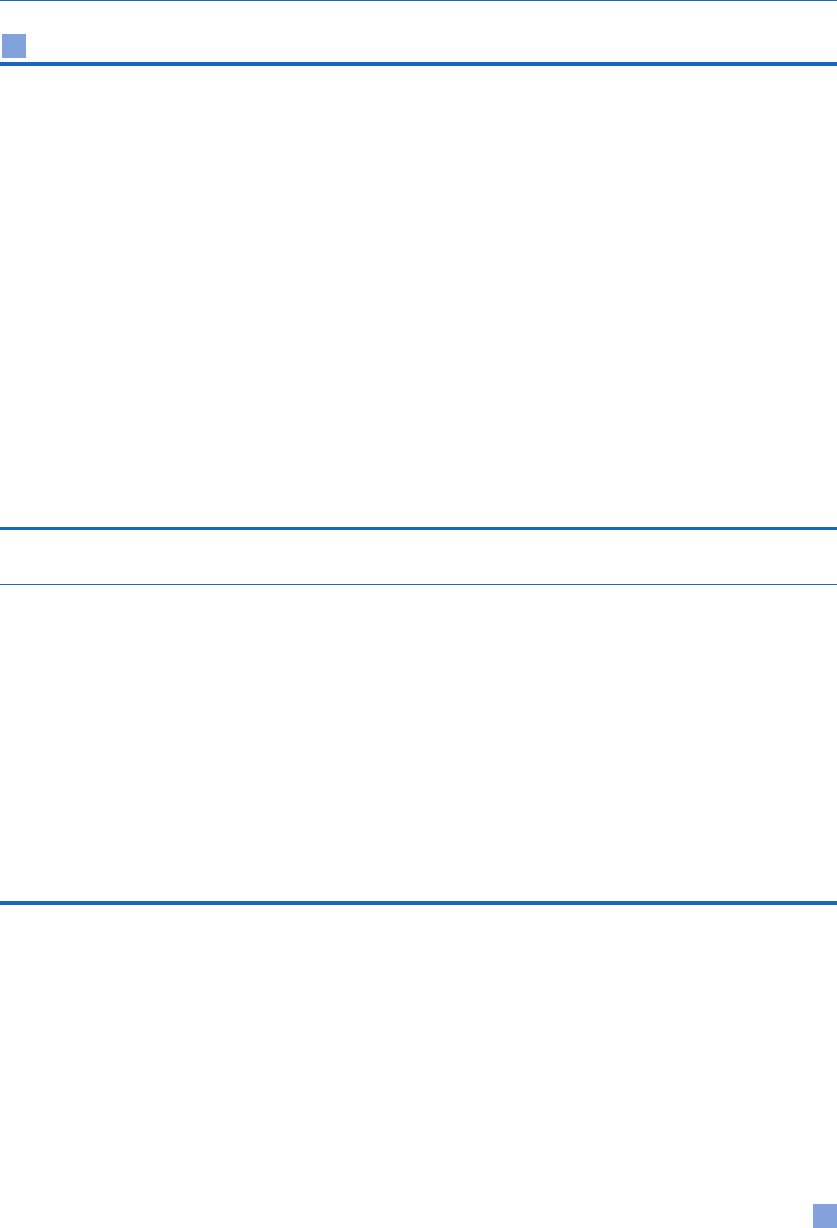
makes it difficult to sell the account receivable. To
compound the problem, the buyer often delays
payment until the merchandise is received – a stan-
dard practice in many countries.
Because of the inherent risks of an open account,
precautions should be taken.The seller must deter-
mine the integrity of the buyer by relying on prior
experience, or through a credit investigation.
Toward this end there are several organizations that
can provide some assistance in terms of credit infor-
mation. First, there are commercial credit agencies
such as the International Dun and Bradstreet’s
1111
2
3
4
5
6
7
8
9
10111
1
2
3
4
5
6
7
8
9
20111
1
2
3
4
5
6
7
8
9
30
1
2
3
4
5
6
7
8
9
40
41
42
43
44
45111
507
TERMS OF SALE AND PAYMENT
Table 17.3 Methods of payment
American firms involved in international trade face a unique set of problems. Ultimately, the goal of any exporter
is to make a sale and be paid. In return, the importer wants to receive the agreed upon goods. Factors such as
distance, time, language, culture and country regulations must be taken into consideration by the prospective
parties, if their needs are to be satisfied.The importer or exporter should ask himself some of the following
questions before selecting the most appropriate method of payment.
■ How reliable is the exporter?
■ How long has the exporter been shipping?
■ Is the exporter’s product subject to inspection?
■ How creditworthy is the importer?
■ Has the importer demonstrated the ability to pay promptly?
■ Can the importer count on getting the goods on time?
■ What credit terms are offered by the competition?
■ What are the political and economic conditions within the importer’s and exporter’s countries?
■ What is the value of the goods?
■ Is this a one-time shipment or does the possibility exist for additional orders?
■ Is the product standardized or specialized, and is it resaleable?
After carefully evaluating the previous questions the importer or exporter is now prepared to select the proper
payment method.
Method Payment Goods available Risk to exporter Risk to importer
to buyer
Cash in advance Before shipment After payment None Relies on exporter to
ship goods as ordered
Letter of credit When goods shipped After payment Little or none Relies on exporter to
and documents depending on L/C* ship goods described
comply, with L/C* in documents
Sight draft, On presentation of After payment Buyer can refuse Same as L/C* unless
documents against draft to buyer goods he can inspect goods
payment before payment
Time draft, On maturity of Before payment Relies on buyer to Same as above
documents against draft pay draft
acceptance
Open account As agreed Before payment Relies completely None
on buyer to pay
his account
Note
*L/C denotes letter of credit.The terms “exporter,” “beneficiary” and “seller” are used interchangeably throughout the
workbook unless otherwise noted.The terms “importer,” “applicant” and “buyer” are also interchangeable.
Source: International Workbook
(Chicago: UnibancTrust, 1985), 1. Reprinted with permission of UnibancTrust.

American Foreign Credit Underwriters Corp.
Second, such organizations as chambers of com-
merce and trade associations may be contacted. In
addition, commercial banks and their overseas
branches or correspondent banks usually have some
useful credit information. Finally, government
sources can also be valuable. World Traders Data
Reports, for example, has a great deal of informa-
tion on foreign firms. In any case, a prudent credit
decision should take into account an importing
country’s political risk and economic conditions.
Before granting credits, an exporter needs to
assess a buyer’s creditworthiness. Credit bureaus
overseas should be consulted. In addition, credit
scoring is another useful technique. Credit scoring
is a process that converts customer credit and finan-
cial information into a numerical format that is then
combined to create a score.The scores will repre-
sent the levels of risk. There is a general consensus
that international business involves many risks
that include customer credit worthiness, country
(economic and political), bank (transactional and
portfolio), transitional market, currency, legal (con-
tract), regulatory and systematic failure. But credit
executives do not agree on whether it is possible to
construct an automated scoring model that is
robust enough to address all the risks simultane-
ously without requiring a judgmental factor.
Credit insurance is another useful tool to miti-
gate risks. This is a standard practice in European
business-to-business transactions. The advantages
are protection against buyer insolvency, greater
borrowing power, and higher sales. However, the
insurance, while covering a buyer’s inability to pay,
does not cover the buyer’s unwillingness to pay. As
such, disputes related to a buyer’s dissatisfaction
with the goods are not covered. Some sellers are
hesitant to pay the cost of insurance, typically
between 0.1 and 0.4 percent of sales for domestic
accounts and between 0.25 to 1 percent of covered
sales for export accounts. They do not realize that
their own bad debt reserves are actually a form of
credit insurance.
18
Cash in advance
The seller may want to demand cash in advance
when:
1 The buyer is financially weak or an unknown
credit risk.
2 The economic/political conditions in the
buyer’s country are unstable.
3 The seller is not interested in assuming credit
risk, as in the case of consignment and open
account sales.
Because of the immediate uses of money and the
maximum protection, sellers naturally prefer cash
in advance.The problem, of course, is that the buyer
is not eager to tie up its money, especially if the
buyer has some doubt about whether it will receive
the goods as ordered. By insisting on cash in
advance, the seller shifts the risk completely to the
buyer, but the seller may end up losing the sale by
this insistence.
Bill of exchange (draft)
A means of financing international transactions is
through a bill of exchange or draft, which is a
request for payment (see Figure 17.3).The request
is an unconditional order in writing from one
person (drawer) requiring the person to whom it is
addressed (drawee) to pay the payee or bearer on
demand or at a fixed or determinable time. The
drawer, usually the exporter, is the maker or origi-
nator of the draft requesting payment.The drawee,
usually the buyer, is the party responsible for hon-
oring or paying the draft. The payee may be the
exporter, the exporter’s bank, the bearer, or any
specified person. In short, a draft is a request for
payment. It is a negotiable instrument that contains
an order to pay a payee.As noted by John Stuart Mill
many years ago, the purpose is to save expense and
minimize the risk of transporting precious metals
from place to place as payment of imports.The bill
of exchange simply allows banks to make adjust-
ments by debiting or crediting accounts maintained
in buyer or seller names with other banks.
508
TERMS OF SALE AND PAYMENT

1111
2
3
4
5
6
7
8
9
10111
1
2
3
4
5
6
7
8
9
20111
1
2
3
4
5
6
7
8
9
30
1
2
3
4
5
6
7
8
9
40
41
42
43
44
45111
509
TERMS OF SALE AND PAYMENT
Nigerian scam artists have made headlines in the
USA. The
Wall Street Journal
, for example, has pub-
lished lengthy articles describing how they have
defrauded American firms and citizens. Crooks have
gone high-tech. Instead of using mailing or faxing
their scam letters, they now rely on e-mail. In one year
alone, Americans fell for the scam and lost $100
million after giving out their account numbers.If unre-
ported losses can be accounted for, the total should
be much higher.The Nigerian scams have been so suc-
cessful to the point that they are Nigeria’s No. 3 or
No. 4 export.
The most prevalent method involves money trans-
fer schemes. Claiming to try to defraud the Nigerian
government, the scam artists typically propose to
transfer millions of US dollars to an overseas bank
account owned by a foreign firm which is promised a
percentage of the transferred funds as “commission.”
The funds are alleged to be overpayments from pre-
vious government contracts. The crooks then request
information about the company’s bank, as well as
blank, signed company letterhead and pro forma
invoices. The firm owning the account is told it will
receive a percentage of the transferred funds as “com-
mission.”The American firm may also be solicited for
a “transaction fee” to enable the supposed transfer of
funds. Invariably, American firms, instead of receiving
any money for their assistance, find that the Nigerian
fraud artists have used the letterhead and bank infor-
mation to withdraw money from their US accounts.
The following is a scam letter.
NIGERIA NATIONAL PETROLEUM CORPORA-
TION(NNPC) PLOT 19, FALOMO ROAD. IKOYI-
LAGOS, NIGERIA.
ATTN: Managing Director/CEO
I am Dr Buba Onuwu director of procurement and
contracts with Nigeria National Petroleum Corpora-
tion (NNPC). I have decided with my director general
in office to contact you quickly on this business of
transferring the sum of USD$30,000,000.00 (Thirty
million United States dollars only) into a foreign
bank account. The need is very urgent. I got your
contact from Nigerian chambers of commerce and it
is with business trust that made me to contact you in
this matter. I write to solicit for the transfer of this
money into your account. This money was generated
from an over-invoiced contract sum in my corpora-
tion (NNPC). We have generally agreed that 20
percent of this said fund is for you as compensation
for using your bank account in transferring this
money. Ten percent should be for all expenses made
for this business, while 70 percent is for us. Please
note that we will arrange to meet you immediately
after successful conclusion of this transfer. The 70
percent share of ours will be used for investment over-
seas. Your assistance and cooperation is highly
needed. I assure you that this business is 100 percent
risk free and as such you should not entertain any fear
in dealing with us.
Should this interest you, we will require your
banking information as mentioned below: 1. YOUR
BANK NAME AND ADDRESS 2. YOUR ACCOUNT
NUMBER WITH THE BANK 3. NAME TO BE USED
AS BENEFICIARY 4. YOUR BANK TELEPHONE
AND FAX NUMBER. Contact me on the above e-mail
address and we hope to conclude this business within
14 working days. Please while writing to me don’t
forget to include your personal telephone and fax
numbers, for easy and quicker communication. I antic-
ipate your urgent positive reply.
Best Regards, Dr Buba Onuwu
Sources:
“Doing Business in Nigeria:Distinguishing Between
the Profitable and the Questionable,”
Business America
(December 1997): 30–2; “Nigerian Financial Scam
Generating Reader Responses,”
San José Mercury News
,
April 17, 2003;“The List: Gotcha!”
Business Week
, July 16,
2001, 10; “Ask the TIC,”
Export America
(July 2001):
16–17.
IT’S THE LAW 17.1 NIGERIAN SCAMS
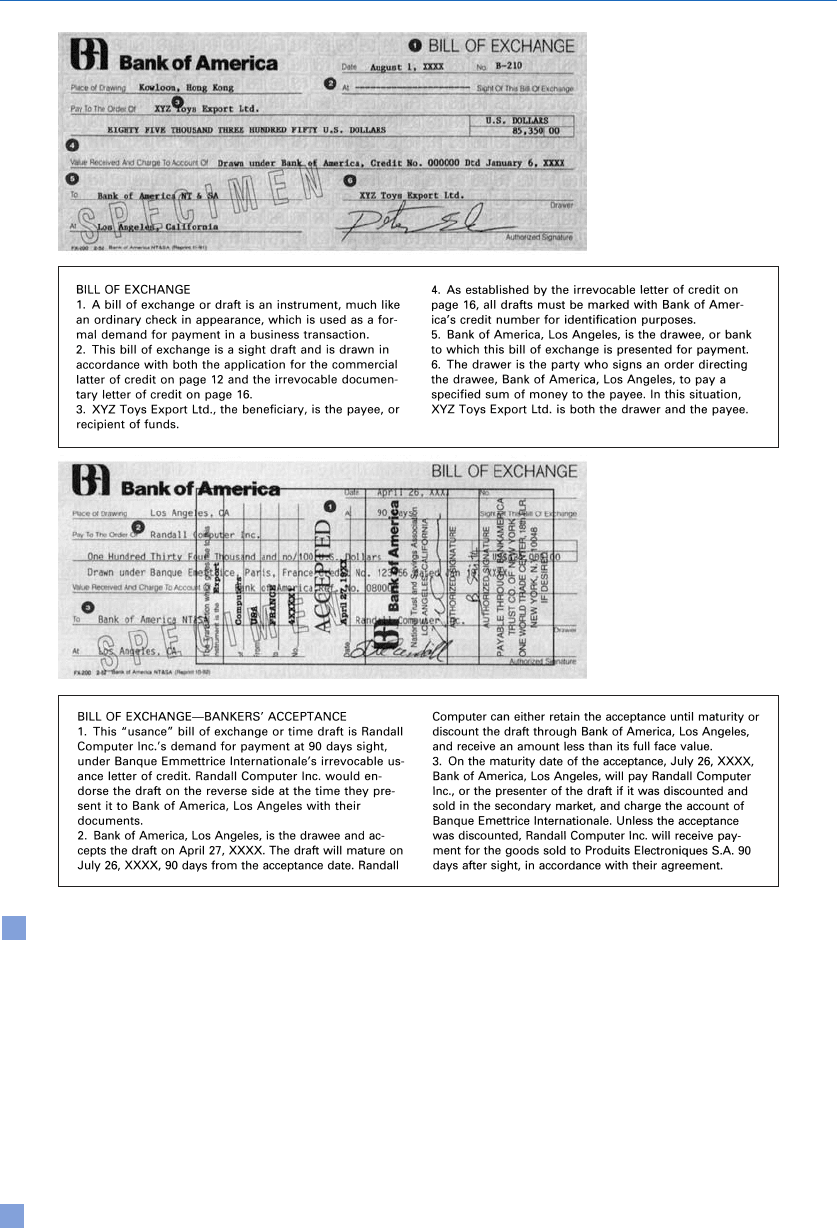
The transaction process occurs in this way. The
drawee accepts the draft by signing an acceptance
on the face of the instrument. If the buyer does
not accept (sign) the bill, the buyer is not given
the attached documents to obtain goods from the
steamship company, since the shipment is made on
the negotiable order bill of lading. In practice, banks
are responsible for payment collection.The original
order bill of lading is endorsed by the shipper and
sent to the buyer’s bank along with the bill of
exchange, invoices, and other required documents
(e.g., consular invoice, insurance certificate, inspec-
tion certificate). Once notified by the bank, the
buyer pays the amount on the draft and is given the
510
TERMS OF SALE AND PAYMENT
Figure 17.3 A bill of exchange
Source: Trade Banking Services
(Bank of America Corporation, 1994), 24–5. Reprinted with permission of Bank of America.

bill of lading, which allows the buyer to obtain the
shipment.
There are two principal types of bill of exchange:
sight and time.A sight draft, as the name implies,
is drawn at sight, meaning that it is paid when it is
first seen by the drawee. A sight draft is commonly
used for either credit reasons or for the purpose of
title retention. A time (usance or date) draft is
drawn for the purpose of financing the sale or tem-
porary storage of specified goods for a specified
number of days after sight (e.g., thirty, sixty, ninety
days, or longer). It specifies payment of a stated
amount at maturity. As such, it offers less security
than a sight draft since the sight draft demands
payment prior to the release of shipping documents.
The time draft, on the other hand, allows the buyer
to obtain shipping documents to draw up merchan-
dise when accepting the draft, even though the
buyer can actually defer payment.
At first sight, it may seem that a time draft is not
really different from an open account, since the
goods may be obtained or picked up by the buyer
before making payment.There is one crucial differ-
ence, however. In the case of the time draft, there
is a negotiable instrument evidencing the obligation.
Since this document may be sold to factors and dis-
counted immediately, the seller can obtain cash
before maturity. In the USA, factors are financial
institutions that buy accounts receivable from man-
ufacturers.
There are other variations of this kind of draft.
If bills of lading, invoices, and the like accompany
the draft, this is known as documents against
payment (D/P). If financial documents are
omitted to avoid stamp tax charges against such
documents or if bills of lading come from coun-
tries where drafts are not used, this type of collec-
tion is known as cash against documents.
Frequently, the draft terms may read “90 days
sight D/A” or documents against acceptance.
Upon accepting this draft, the buyer is permitted
to obtain the documents and the merchandise
while not being obliged to make payment until the
draft matures.
Bankers’ acceptance
A bankers’ acceptance assists in the expansion of
credit financing. A bankers’ acceptance is a time
draft whose maturity is usually less than six months.
The draft becomes a bankers’ acceptance when the
bank accepts it; that is, the bank on which the draft
is drawn stamps and endorses it as “accepted.” Drafts
drawn on and accepted by nonbank entities are
called trade acceptances. US dollar bankers’
acceptances are negotiable instruments and may be
used in conjunction with letters of credit.
19
An acceptance becomes the accepting bank’s
obligation, and once accepted it becomes a nego-
tiable instrument that may be bought or sold in the
market like a certificate of deposit (CD) or com-
mercial paper. Daily newspapers usually list the
daily prices of bankers’ acceptances in the financial
section. The acceptance commission is the reason
that a bank lends its name, integrity, and credit
rating to the instrument. The discount charge is
computed at the current prime bankers’ acceptance
rate from date of purchase to maturity.The bank has
primary responsibility for payment to the accep-
tance holder at maturity, but the draft originator
still has secondary liability in case the accepting
bank does not honor the claim.
Letter of credit (L/C)
An alternative to the sight draft is a sight letter of
credit (L/C). As a legal instrument, it is a written
undertaking by a bank through prior agreement
with its client to honor a withdrawal by a third party
for goods and services rendered (see Figure 17.4).
The document, issued by the bank at the buyer’s
request in favor of the seller, is the bank’s promise
to pay an agreed amount of money on its receipt of
certain documents within the specified time period.
Usually, the required documents are the same as
those used with the sight draft. In effect, the bank
is being asked to substitute its credit for that of
the buyer. The bank agrees to allow one party to
the transaction (the seller, creditor, or exporter)
to collect payment from that party’s correspondent
1111
2
3
4
5
6
7
8
9
10111
1
2
3
4
5
6
7
8
9
20111
1
2
3
4
5
6
7
8
9
30
1
2
3
4
5
6
7
8
9
40
41
42
43
44
45111
511
TERMS OF SALE AND PAYMENT
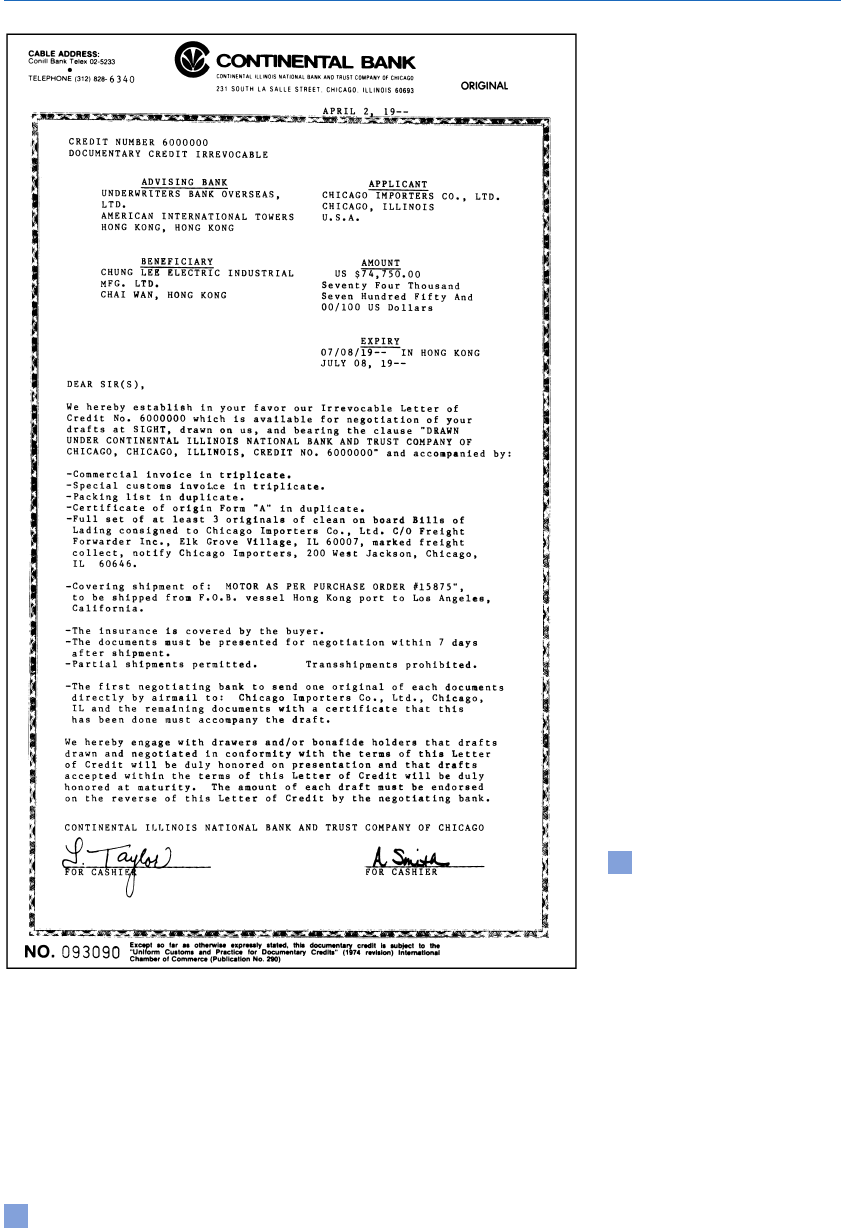
bank or branch abroad. Drafts presented for
payment under the L/C are thus drawn on the bank.
The importer can repay the bank by either making
an appropriate deposit in cash or borrowing all or
part of the money from the bank. The drawee
(buyer) is usually responsible for the collection
charges by banks at home and overseas. Figure 17.5
examines the process involved in a letter of credit.
Several banks may be involved in the process.The
issuing bank, as a rule, issues letters of credit for its
current customers only, even if collateral is offered
by someone else. In contrast, the advising bank is the
512
TERMS OF SALE AND PAYMENT
Figure 17.4 Import
commercial letter of credit
Source:
Reprinted with permission
of Continental Illinois National
Bank and Trust Company of
Chicago.
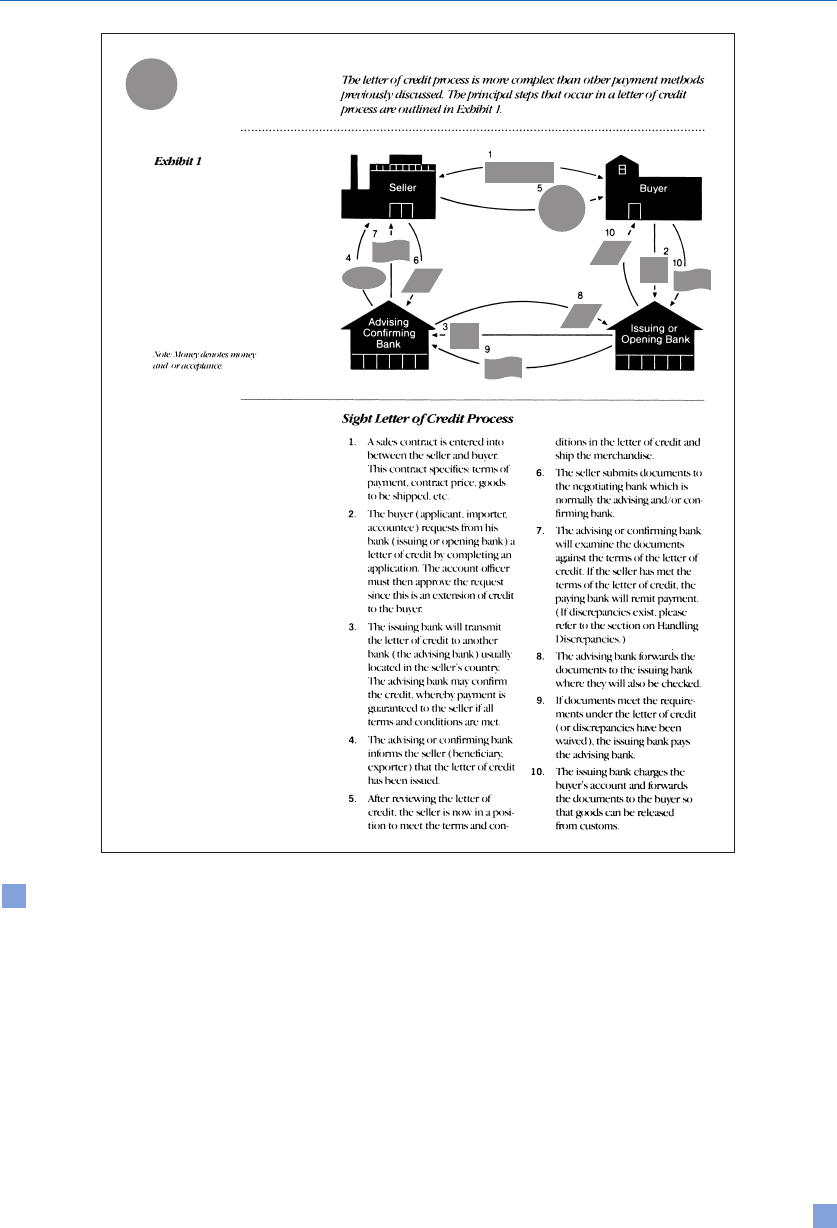
bank which notifies the exporter that an L/C has
been issued.The issuing bank forwards the L/C to
the advising bank (its foreign correspondent), which
is usually selected for its proximity to the benefi-
ciary. In the case of a confirming bank the same ser-
vices are performed as the advising bank but also the
confirming bank becomes liable for payment.
There are several types of letters of credit,
including revocable, irrevocable, confirmed, uncon-
firmed, standby, back-to-back, and transferable.
Revocable letter of credit
With a revocable L/C, the issuing bank has the right
to revoke its commitment to honor the draft drawn
1111
2
3
4
5
6
7
8
9
10111
1
2
3
4
5
6
7
8
9
20111
1
2
3
4
5
6
7
8
9
30
1
2
3
4
5
6
7
8
9
40
41
42
43
44
45111
513
TERMS OF SALE AND PAYMENT
Sight letters of credit
Sale Contract
Goods
DOX
DOX
DOX
L/C
App.
L/C
Money
Money
Money
Advice
Figure 17.5 Process involved in a sight letter of credit
Source:
International Workbook (Chicago: UnibancTrust, 1985), 3. Reprinted with permission of UnibancTrust.

on it.Without prior warning or notification to the
seller, the bank can cancel or modify its obligation
at any time before payment – even after shipment
has already been made. Since the bank’s commit-
ment is not legally binding, the protection to the
seller is minimal. Exporters generally do not want
to accept a revocable L/C.
Irrevocable letter of credit
This type of L/C is much preferred to the revoca-
ble letter of credit. In this case, once the L/C is
accepted by the seller, it cannot be amended in any
way or cancelled by the buyer or the buyer’s bank
without all parties’ approval. It is possible, however,
for the buyer who receives proper documents but
unsuitable goods because of fraud to obtain an
injunction preventing the banker from paying the
fraudster. When Worlds of Wonder, a US toy
company, filed for bankruptcy protection, four
Hong Kong creditors/suppliers were able to use
irrevocable letters of credit to collect $16.5 million
from an undisclosed bank. Another Hong Kong
manufacturer, Applied Electronics, could not
recover any of its debt since it held no outstanding
letters of credit.
Confirmed letter of credit
For the exporter, it is highly desirable for the L/C
to be confirmed through a bank in the exporter’s
country because the exporter then receives an addi-
tional guarantee of payment from a second bank
(i.e., the confirming bank).The advising bank sends
a cover letter along with the original L/C to the
exporter, stating that the L/C has been confirmed.
A US exporter is in a much better position if there
is a US bank that accepts the responsibilty of paying
the letter of credit in case of refusal to do so by the
buyer and/or the buyer’s bank (i.e., issuing bank in
a foreign country). In the early 1980s, the political
crisis in Iran, for example, made it impossible for
many American sellers to enforce the payment
terms specified in unconfirmed letters of credit.
Naturally, a confirmed L/C is more desirable when
payment is guaranteed by two banks instead of one,
especially if there is some doubt about the issuing
foreign bank’s ability to pay. Moreover, since the
confirming bank is located in the same country
as the exporter, the exporter is able to receive
payment more readily by presenting documents
to the confirming bank (rather than the issuing
bank abroad) to show that all obligations have been
completed.
Honesty is a virtue that cannot be taken for
granted in international trade. A seller may, for
example, ship unordered or inferior goods while
collecting payment. A buyer may refuse to pay for
goods received. It must be emphasized that a mar-
keter can never be too cautious or careful when
dealing in international trade. In the case of a con-
firmed letter of credit, the seller should not accept
a statement from a bank that “confirms the existence
of an L/C” because to confirm the existence of
something is not the same thing as to confirm an
L/C. A confirmed L/C requires the bank’s engage-
ment (i.e., taking obligation). In addition, the bank
that confirms the L/C must be financially sound,
and the exporter should specify that “the confirm-
ing bank must be acceptable to the seller.”
Unconfirmed letter of credit
When the L/C is not confirmed by a bank in the
seller’s country, the certainty is less and payment
slower.An unconfirmed letter of credit may still be
acceptable as long as the foreign bank that issues it
is financially strong. In fact, some multinational
banks are so well known that they prohibit letters
of credit issued by them to be confirmed because
confirmation would tarnish their prestige.However,
letters of credit can still be confirmed confidentially.
It is possible to combine the several types of
L/C. A letter of credit can be revocable and con-
firmed, irrevocable and unconfirmed, and so on.
For maximum security and earliest payment, the
seller should ask for an irrevocable and confirmed
L/C. Japan’s MITI, for example, requires irrevoca-
ble letters of credit before it will issue insurance
coverage for exporters to Brazil.
514
TERMS OF SALE AND PAYMENT
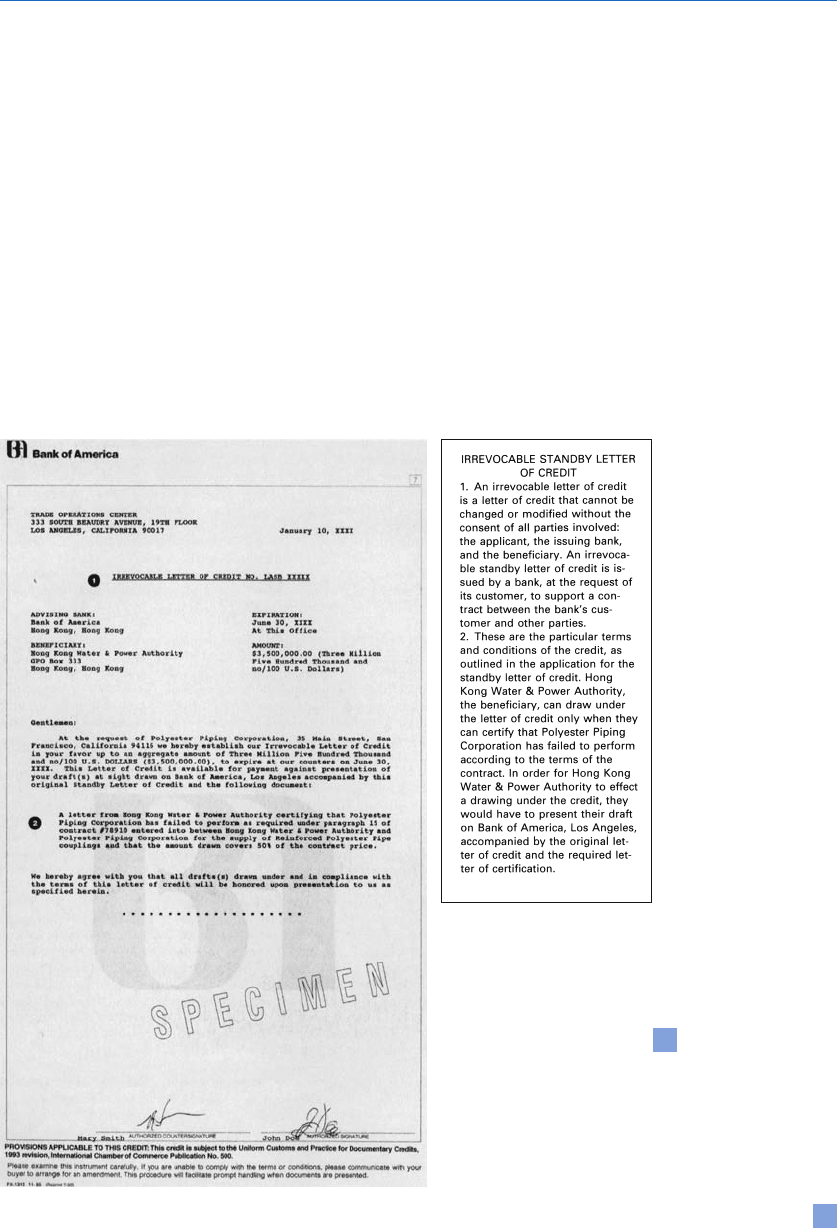
Standby letter of credit (bid or
performance L/C)
Unlike the purpose of a commercial L/C, which is
trade-related, the purpose of a standby L/C (special
purpose or bid or performance L/C) is to guaran-
tee a seller’s obligation under a contract or agree-
ment. It is used for such purposes as a performance
bond, bid bond, surety bond, and loan agreement
(see Figure 17.6). In this case, it is the buyer that
requires the seller to open an L/C naming the buyer
as a beneficiary, instead of the other way around.The
reason for this arrangement is that the subsequent
failure of the seller to fulfill the agreement can be
quite damaging to the buyer, since a period of time
has elapsed and the buyer has to seek a new supplier
all over again. Because of the possibility of a loss of
profit as a result of a delay or failure of the seller,
the buyer needs to be assured that the seller is
indeed capable of delivering goods or completing
the project as promised. A standby L/C is thus a
bank’s guarantee to the beneficiary that a specific
sum of money will be received by the beneficiary
under certain conditions. If the beneficiary is the
buyer, the firm can draw under the standby L/C
only when the applicant (seller) fails to meet its
obligations. On the other hand, the beneficiary can
1111
2
3
4
5
6
7
8
9
10111
1
2
3
4
5
6
7
8
9
20111
1
2
3
4
5
6
7
8
9
30
1
2
3
4
5
6
7
8
9
40
41
42
43
44
45111
515
TERMS OF SALE AND PAYMENT
Figure 17.6
Standby letter of
credit
Source: Trade Banking
Services
(BankAmerica
Corporation), 30–1.
Reprinted with permission
of Bank of America.
